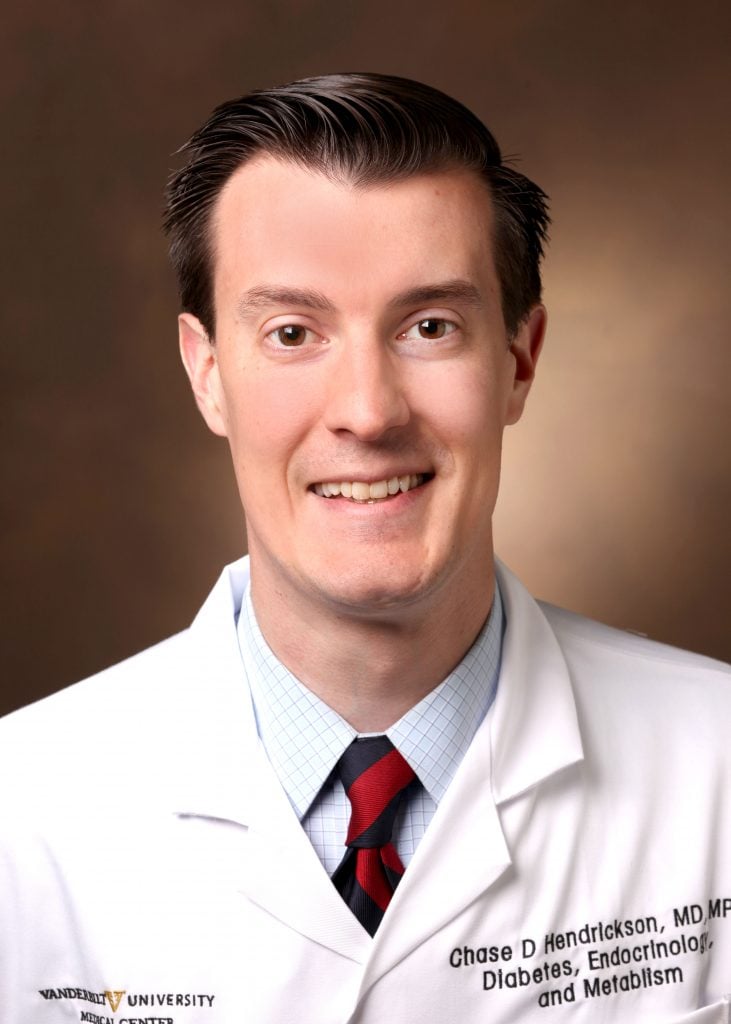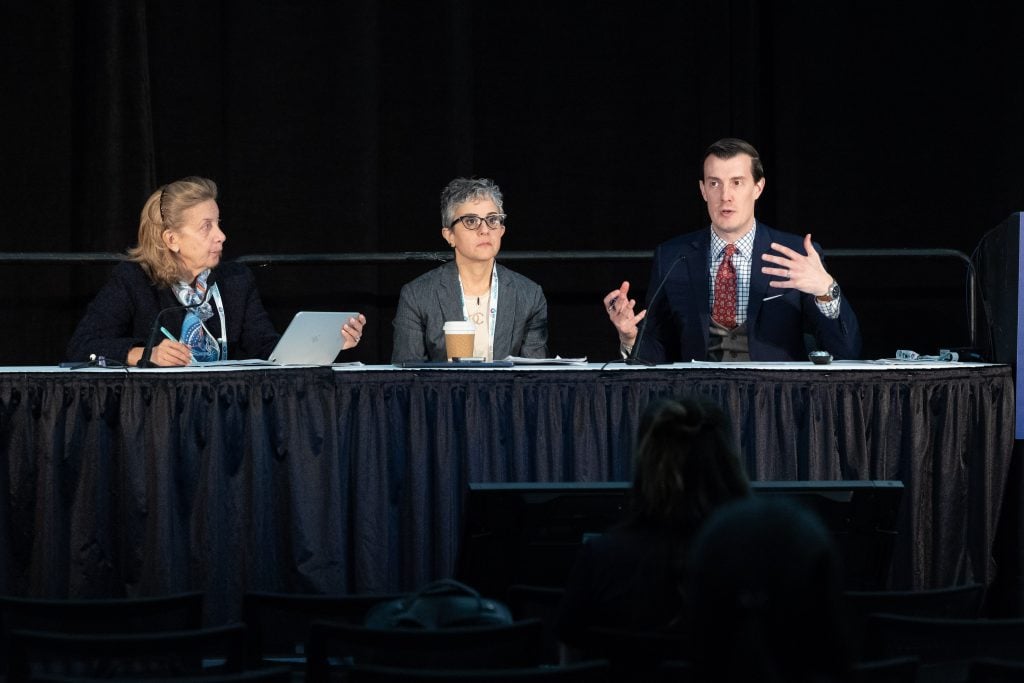When the Endocrine Society debuted the Endocrine Feedback Loop podcast back in 2020, it quickly took on a life of its own as host and creator Chase Hendrickson, MD, MPH, explains to Endocrine News. More than simply a new and improved journal club, the podcast seeks to educate, inform, and enlighten both listeners and the hosts as well.
In 2020, the Endocrine Society debuted its monthly journals club podcast, Endocrine Feedback Loop, first as a members-only benefit but now freely available on all of the standard podcast platforms, with episodes that feature expert educators and topical specialists discussing and dissecting articles from the Society’s journals.
Host Chase Hendrickson, MD, MPH, practices general endocrinology at the Vanderbilt University Medical Center where he is the executive medical director for the Medicine Patient Care Center at VUMC and formerly an associate program director for the endocrinology fellowship program. His interests include endocrine education, teaching inferential methods, and quality improvement. However, during ENDO 2024 in Boston, Hendrickson recorded an episode of the podcast before a live audience where he was joined by Ghada El-Hajj Fuleihan, MD, from the American University of Beirut, and Amal Shibli-Rahhal, MD, from University of Iowa Carver College of Medicine where they discussed a recent article from The Journal of Clinical Endocrinology & Metabolism entitled “Bisphosphonate Use and Risk of Atypical Femoral Fractures: A Danish Case-Cohort Study With Blinded Radiographic Review” published in January 2024.
Hendrickson spoke to Endocrine News about the origins of the podcast, his affinity for journal clubs, and the iterative nature of teaching and learning that comes out of these discussions – a literal feedback loop of education.
Endocrine News: First off, tell me a little about the origins of Endocrine Feedback Loop and how you landed the hosting gig.
Chase D. Hendrickson: I have always enjoyed participating in journal clubs. About five years ago, I began to consider whether that could be done on a larger scale via a podcast with the idea of targeting an audience of all endocrinologists and not just fellows. At the time, Alan Dalkin at the University of Virginia was visiting our group at Vanderbilt University. As he had worked with the Endocrine Society on education initiatives in the past, I discussed my idea with him. He liked it and was instrumental in helping me pitch the idea to the Endocrine Society. Given my interest in the work, I volunteered to run the project and be the host of the podcast itself.

I learn an incredible amount during each episode. As a general endocrinologist, I have a broad knowledge base in endocrinology but not one that is as deep as a subspecialist. So, I am always in awe of our regular contributors and guest experts, who bring an incredible depth of knowledge, experience, and insight to these recordings.
Chase Hendrickson, MD, MPH
EN: Can you walk me through a typical podcast, from picking a subject to the final product?
CDH: Our team is made up of 12 “regular contributors” who typically volunteer to participate for a three-year term. They each sign up for one month during the podcast’s year-long season. A few weeks before each regular contributor’s assigned month, I reach out to start the process of selecting an article to review. If the regular contributor has an area of expertise within endocrinology, we typically select an article in that field from either The Journal of Clinical Endocrinology & Metabolism (JCEM)or the Journal of the Endocrine Society (JES). We choose articles that are likely to change or at least inform clinical care. Once we select an article, we decide on a guest expert to invite to participate in that episode, basing the invitation on the topic(s) covered in the article. The regular contributor and I then each independently analyze the article, identifying key points of the article we want to review and any areas where we have concerns or disagree with the authors’ conclusions. We draft a discussion guide to help with the recording session and then send it along to the guest expert for further refinement. The final version of that guide keeps us on the same page during the podcast recording, which we do over Zoom. The whole time, the producers of the podcast keep the logistics organized, and they put a lot of work in after the recording to get the episode ready to release later in the month.
EN: The podcast series is modeled after journal clubs found at educational institutions. Can you speak a little more about that decision? Was that something that came organically?
CDH: My love for journal clubs developed during my own fellowship at Dartmouth. My program director Rich Comi conducted weekly journal clubs, which were a highlight of my training. At the same time, I did an MPH at Dartmouth, which gave me a deeper understanding of biomedical research and biostatistics. I run the journal club for the fellows here at Vanderbilt and enjoy doing that. We spend a significant amount of time reviewing study designs as the key to critically analyzing the articles we discuss. I try to do brief versions of that in the Methodology sections of each of our podcasts.
EN: What has been your favorite episode?
CDH: I doubt I could pick a favorite episode! However, the episodes that we recorded at ENDO 2023 and ENDO 2024 were great fun, as I got to be in the same room as our regular contributors and guest experts and involve fellows from other institutions in the process.
EN: Or to put it another way, as the series description reads, the podcast “seeks to provide endocrinologists in all stages of their careers with supplemental insight into hot topic issues and study designs.” I assume that goes for the host as well. Have there been any surprises or eureka moments for you during a podcast?
CDH: I learn an incredible amount during each episode. As a general endocrinologist, I have a broad knowledge base in endocrinology but not one that is as deep as a subspecialist. So, I am always in awe of our regular contributors and guest experts, who bring an incredible depth of knowledge, experience, and insight to these recordings. My job is the easy one in that I only have to come up with the questions that endocrinologists, me included, would have about an article. I then simply ask that question of the rest of the team and sit back and learn along with our listeners as they give such great answers.

EN: Can you talk about what the reception to the podcast has been?
CDH: The podcast’s reception has been encouraging. While we are still trying to get the word out to folks, listeners have been kind in their response and feedback, which has been nice to hear.
EN: You were also the program director for the endocrinology fellowship program at Vanderbilt, with an interest in education. Do you see this podcast as another teaching venue of sorts?
CDH: Until earlier this academic year, I was an APD for Vanderbilt’s fellowship program. That work meant a lot to me, as teaching fellows ranks high on the list of the work I value. Though the type of teaching we do on the podcast is quite different in terms of methods and audience, I do see it as educational in nature.
EN: On that note, you’re also involved with the Society’s recruitment efforts to help support the endocrinology pipeline. Has this podcast been a vehicle to reach potential future endocrinologists as well?
CDH: For any potential future endocrinologists, I hope that exposure to the podcast would help convince them to join our profession. By discussing these articles, we naturally cover exciting advancements, diagnostic and management challenges, and the impact we have on patients in endocrinology.
EN: Do you have any advice for endocrinologists who would like to have their insight featured on a future episode?
CDH: I review all of the articles published in JCEMand JESfor consideration for inclusion in an episode of the podcast. So, if an author is interested in having work featured on the podcast, then the first step is to get the work published in one of the Society’s journals! We are interested in any and all feedback, including suggestions on articles to review, and those can be sent to: [email protected].
Bagley is the senior editor of Endocrine News and has been with the Endocrine Society since 2013. He wrote about the Endocrine Society’s Medical School Engagement Program in the July issue.

